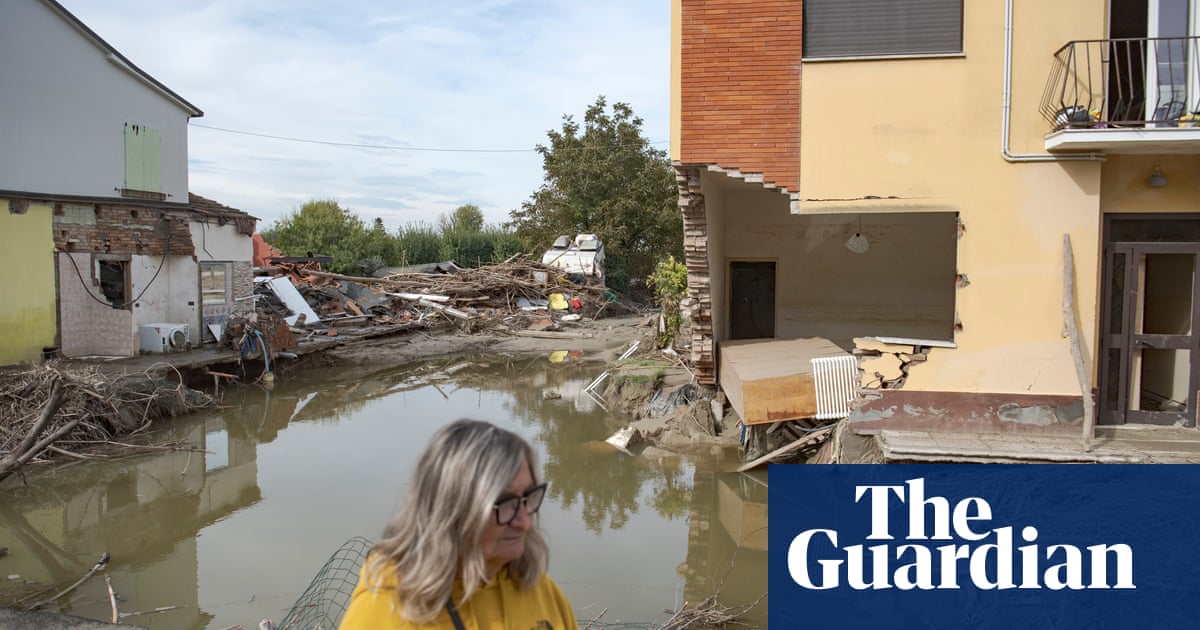It was 2am when the parish priest, Giovanni Samorì, was woken by a phone call from the mayor of Traversara ordering him to start ringing the church bells. The traditional call now forms part of the civil protection procedure deployed by many Italian towns. Its aim: to warn residents of impending calamity.
As torrential rain pounded the village, Samorì sprang into action, a task he compares to “sounding the death knell”. It worked: the evacuation of Traversara’s 480 residents was swift and, despite the priest’s foreboding, there were no deaths.
But, a few weeks on from the flooding of 19 September, when the northern Italian region of Emilia Romagna was struck by its third devastating storm in less than 18 months, the destruction of Traversara is clear. The hamlet, on the banks of the Lamone River about 40 minutes from the regional capital of Bologna, has been all but wiped out.
In its place has come a fraught but urgent debate about insurance coverage for losses from climate-related catastrophes, which until now has remained an unfamiliar concept for most Italians. Italy has become known by scientists as one of Europe’s climate risk hotspots and is beginning to reckon with the widespread implications of extreme weather to livelihoods and the economy.
Currently just 6% of homes are insured against natural disasters, and 5% of businesses. That, says the government, needs to change.
The government has proposed making it obligatory from January for businesses to be insured against natural disasters, a move that has proved particularly unpopular in areas most at risk. There were also hints at extending it to households.
Yeah sorry look at Western NC. A friends house was hit by a mudslide and he lost everything. Insurance won’t do fuck because they are calling it flood damage.
Fuck insurance. Fucking scam.
We need more insurance organized by credit unions. If the whole world bought disaster insurance, we might try preventing disaster.
Those exist they are called “mutuals” but I don’t think they have a better track record vs other company types.
Insurance is the world’s biggest scam. If only jt was done honestly.
The government has proposed making it obligatory from January for businesses to be insured against natural disasters, a move that has proved particularly unpopular in areas most at risk. There were also hints at extending it to households.
Fascists neutering mutual help and helping private interests, surprise.
Problem is you need to price it into the taxes. So the alternative is a mandatory insurance that is done indirectly through taxation.
Now who gets to pay these taxes and who manages to dwindle out of it, using deliberately planted loopholes?
For insurance it is normal that your rate corresponds to your risk. For taxes or social insurance that is not the case. Why should i pay for other people enjoying living dangerously near the sea, in river flooding areas or the like? If i move to such a place, why should others pay for me? What about houses that are built improperly or where protective measures have been neglected?
It is certainly possible to create some sort of public weather insurance. But it has to go along with forcing people to properly build and maintain their houses as well as driving them out of areas, impossible to maintain housing in under climate change. This too will be deeply unpopular.
I think properly regulating insurance businesses is the more frutiful way of going about this.
It can be included into property taxes and yes, building codes are a thing and aren’t deeply unpopular.
All insurance brokers are scum. They are there to extract wealth, not protect.
Government help for disaster relief is pretty standard stuff, and yes, it’s paid through taxes
That’s about trying to not have things flooded, and saving lives. It’s not about replacing your home or restaurant.
That said there’s nothing whatsoever stopping Italy from having a public-law insurance company. Stuff doesn’t need to be profit-oriented to provide insurance and unlike with health insurance, it’s actually reasonable to expect people to risk-manage in the sense that if you insist on building a house at the bottom of a valley, yeah flood insurance is going to cost quite a bit more than if you build it 30m up.
I’m in Italy, there are public funds spent for rebuilding disaster areas, floods, earthquake, etc.
deleted by creator
Me I think it’s a good idea. I’m not an insurance agent and not wealthy.
But when these things happen people need a way to rebuild. They need money. Where else is the cash going to come from?
No cash? Now what?
deleted by creator
yeah I find the limits of insurance come in to play to. building across from me was on fire a few years ago and its still under construction. I had heard because of insurance arguments. I doubt the insurance is paying for all the folks who used to live there to rent a place till construction is complete.
The Guardian - News Source Context (Click to view Full Report)
Information for The Guardian:
MBFC: Left-Center - Credibility: Medium - Factual Reporting: Mixed - United Kingdom
Wikipedia about this sourceSearch topics on Ground.News



